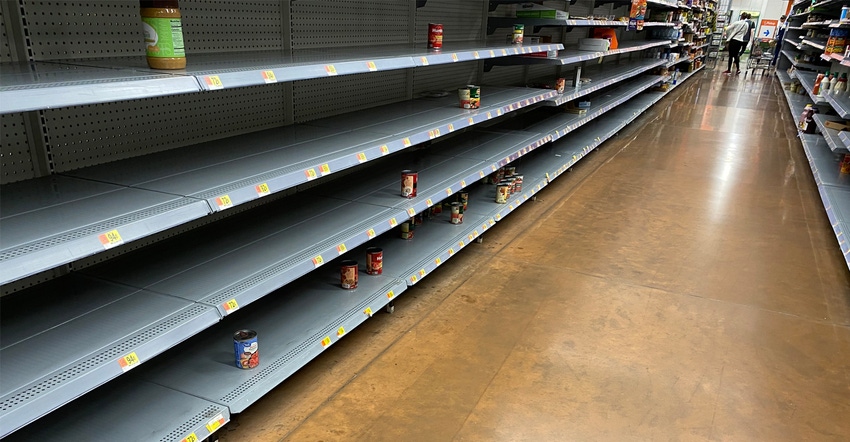
Someday, COVID-19 will be in the rearview mirror. The question is this: Will the view through the windshield ever be the same as it was before the novel coronavirus that causes it emerged in China?
That question particularly applies to the meat processing industry, where a high level of concentration had already created concern in some corners before the pandemic illuminated every flaw in the country’s food supply chain.
Related: Complete coronavirus coverage
The beef processing industry had already seen the impact that the shutdown of a single plant can make when a fire on Aug. 10, 2019, caused the Tyson plant at Holcomb to be closed into December, shutting down about 5% of the nation’s beef processing capacity.
“In the case of the Holcomb fire, the industry was able to redirect processing without significant losses to the supply of beef because the capacity was there elsewhere,” says Sarah Little, spokeswoman for the North American Meat Institute. “The supply chain flexed, and the food chain was fixed. In the pandemic, we have multiple plants affected in multiple states, some closed and others slowed down. It’s much harder to do the redirection.
“In this crisis, we are also trying to figure out how to shift away from food service to supply retail. And our producers are facing a situation where there is nowhere to go with their livestock when it’s ready to market.”
Little says the changes in plants to keep workers safe — slowing production to allow more space between employees, installing protective shields between workers and stepping up the level of personal protective equipment — show that the industry can respond. She praises the executive order declaring meat processing an essential industry and ordering plants to remain open.
“We took member calls on Friday [May 8] and we had one suggestion that we make what we have learned available to other manufacturers such grocers, bakers, distributors and others to keep employees working,” she says. “Food is essential, and we need to keep the supply chain open while keeping our workers safe on the job.”
In Colorado, Nick Levendofsky with Rocky Mountain Farmers Union, says the pandemic has shone a light on something his organization has long maintained: the meat processing industry is too concentrated to be resilient in a time of crisis.
“We have lost almost all our network of smaller packers that once served local areas and put everything in the hands of four companies that process more than 80% of all the beef in the country,” says Levendofsky. “If one of those plants goes down, the farmers who have contracts to deliver fat cattle to that plant have no place to go. In a crisis like this, when multiple plants have to slow down or shut down, it’s a huge problem that actually breaks the supply line to grocery stores. You wind up with a glut of meat on the hoof and empty shelves in the store.
“In my opinion, what this pandemic is telling us is that needs to change.”
Little says one concern she is hearing from North American Meat Institute members is that longtime political enemies of animal agriculture will use the crisis as an opportunity to push for a political agenda.
“There are people who want to just do away with meat,” she says. “On the flip side, there are people who want to do away with all the rules that keep the meat supply safe. I think we will see permanent change as a result of the lessons we are learning though these hard times. But those changes need to be positive ones for the industry and for consumers.”
Levendofsky says he thinks the changes will be driven by the need to fix the system so that it works for producers and consumers as well as it has for processors and retailers.
“We have already seen a movement toward consumers wanting to know where their food comes from and how it is produced and processed,” he says. “I think we’re going to see that this pandemic and its consequences have amplified that movement. We’re going to need a short-range plan for change and a long-range plan for change. But now that we have exposed all the vulnerabilities that have been under the surface for years, we have to explore new options.”
What those options are and how they will change the meat processing picture is less obvious.
Levendofsky says he expects pressure to break up the “Big Four” in beef processing.
“I’ve been getting a lot of calls from members saying we need to do something to enforce existing antitrust laws and pass stronger ones,” he says. “I think we’re learning some hard lessons about food security. The structure that brings the greatest efficiency isn’t necessarily the structure that is most resilient.”
Small processors see wave of demand
The crisis has created a situation where the small, independent packers that are still in business are being flooded with requests for both processing services and processed beef and pork. Most are booked at capacity well into next year.
Denise Swenson, who with her husband, Dick, and son Ryan processes their own cattle and do custom processing for some neighbors at two smaller processing plants — Duis Meats near their home in Concordia and Smoky River Meats in Salina — says they have been “slammed” with people looking for a place to deliver animals.
“Ryan manages our plants,” she says. “We have been just running as fast as we can, and we can’t keep up with the demand. He ground 1,800 pounds of hamburger on Monday and it was gone by Wednesday. We have limited people to no more than 30 pounds to make sure that we have enough for everyone who wants meat.”
Swenson says every time there’s an announcement of another plant being down because of sick workers or the need to clean or revise the workspace for social distancing, the phone rings.
“We’ve actually hired an extra person to do nothing but answer the phone,” she says. “As soon as you hang it up, it rings again.”
They have had calls from farmers who say they have cattle in the feedlot ready to deliver and the plant can’t take it. They call looking for a place to go.
“We are maxed out. We are booking beef into April of 2021,” she says.
Swenson says they did close down lobby sales and take orders over the phone for customers to pick up curbside.
“We have to do everything we can to keep our workers safe,” she says. “They are being very careful about where they go and what they do when they aren’t working. We haven’t had anyone sick so far and we hope we don’t have any.”
Swenson says she expects to see a continued trend toward consumers preferring to buy from smaller packers.
“The trend is already there,” she says. “The ‘know your farmer, know your food’ trend is been growing for a while. This is causing it to escalate.”
She adds that one of the problems her plants would face if they tried to increase operation is a lack of storage.
“Our cold rooms are full,” she says. “We don’t have freezer space.”
Yoder sees big increases in boxed beef prices
At Yoder Meats, based in Yoder with three stores in Wichita, owner Chad Bontrager says demand is “through the roof” from both the retail side and the customers seeking custom processing.
“Two places are notably down,” Bontrager says. “Out snack sticks for youth fundraisers just aren’t selling right now. And we’ve seen a drop in our wholesale accounts to restaurants. Although those seem to be coming back a little bit.”
Yoder Meats’ mainstay is the beef, pork and chicken it processes in its own plant, but Bontrager ssaysaid he does buy some boxed meat, especially beef, because wtheye can’t keep up with the demand.
“What I have seen is much higher prices and shortages of some products. And unfortunately, I’ve had to pass those higher prices along to consumers,” Bontrager says.
On the custom slaughter side, Bontrager says he is booking into late February of 2021 for custom slaughter.
“That’s just crazy,” he says. “Normally, even in busy times, we’d be booking maybe two months out. I do feel for the consumer who bought a hog or a fat steer and got such a ‘great deal’ and now can’t find a processor.”
Bontrager says he expects that there will be some consumers who have turned to smaller processors to find available meat who will like the quality and the service and continue to buy outside the main supply chain.
“I think it will maybe be a year or two and then most people will return to what is the easiest and the cheapest,” he says. “But I hope that I will gain some permanent, regular customers as a result of people being introduced to us for the first time.”
Yoder has temporarily suspended sales of its popular meat bundles — a “small” bulk-buying opportunity that has proved popular for consumers looking for a way to have some added meat in the freezer but don’t have the storage for buying a whole hog or a side of beef.
Sale barns see flood of cattle, low prices
For Jim Martin, one of the owners of Fort Scott Livestock, the disparity in prices is a sign that the system needs to fundamentally change to give the producers a bigger share of the profits.
He says there have been “big runs” of steers and calves with giant differences in sales prices.
“We’re getting in those 700-pound steers ready to go to feedlots and they are very hard to move,” Martin says. “They are selling, but the prices are below the cost of production. It is just sad to see that.
“Meanwhile, the grocery stores are out of meat and hamburger is selling for $7 a pound and the price on the cutout just keeps going up. There’s something wrong somewhere. I guess there will be an investigation, but there have been investigations before that didn’t fix anything.”
He says the price of calves going on grass is holding steady and maybe even up a little in the first weeks of May.
“The sale barns are all open and seeing good volume,” he says. “But moving fat cattle to processing and stockers to the feedlots … they just aren’t bidding anything.
“I feel so bad for the producers. They can’t do anything to reduce the cost. It’s money already spent. It’s such a shame that we’ve lost all of the small packers. They used to be all around us in Iola, Pittsburg, just everywhere. It’d be a relief valve for sure to have them operating.”
Read more about:
Covid 19About the Author(s)
You May Also Like






